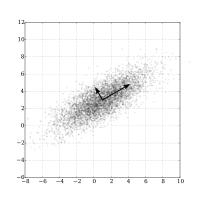
Photo from wikipedia
Long-term prediction of rainfalls is one of the most challenging tasks in stochastic hydrology owing to the highly random characteristics of rainfall events. In this paper, a novel approach is… Click to show full abstract
Long-term prediction of rainfalls is one of the most challenging tasks in stochastic hydrology owing to the highly random characteristics of rainfall events. In this paper, a novel approach is adopted to develop a hybrid regression model for 1-month-ahead rainfall forecasting at two rain gauge locations (namely: Tabriz and Urmia stations), in northwest Iran. The approach is based on the integration of support vector regression (SVR) and firefly algorithm (FFA) that results in truthful rainfall forecasts. The proposed hybrid model was trained and validated using weak stationary state of monthly rainfall data obtained from the gauges. The efficiency results of the model were also cross-validated with those of stand-alone SVR- and genetic programming-based forecasting models developed as the benchmarks in this study. For both rain gauge locations, the results showed that the hybrid model significantly outperforms the benchmarks. With respect to the average efficiency results at the gauge locations, the FFA-induced improvement in the SVR forecasts was matched by an approximately 30% decrease in root-mean-square error and around 100% increase in Nash–Sutcliffe efficiency. Such a promising accuracy in the proposed model may recommend its application at monthly rainfall forecasting in the present semiarid region.
Journal Title: International Journal of Environmental Science and Technology
Year Published: 2018
Link to full text (if available)
Share on Social Media: Sign Up to like & get
recommendations!